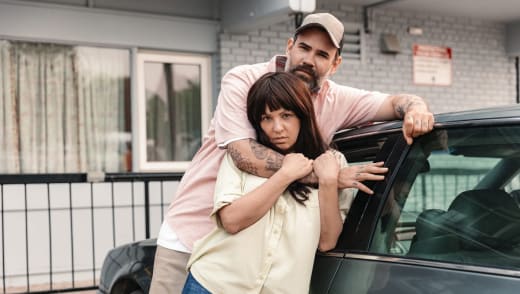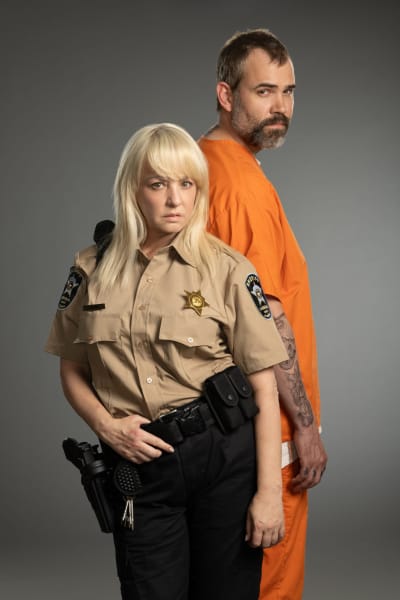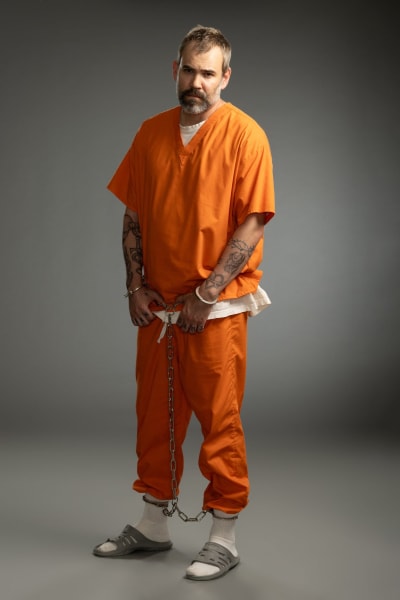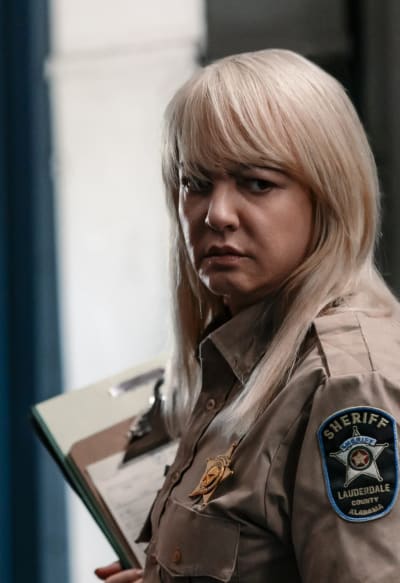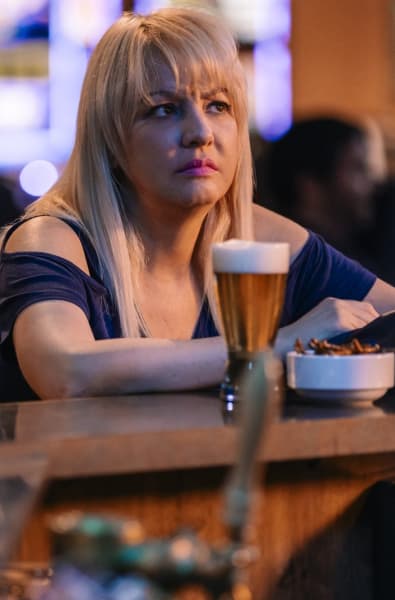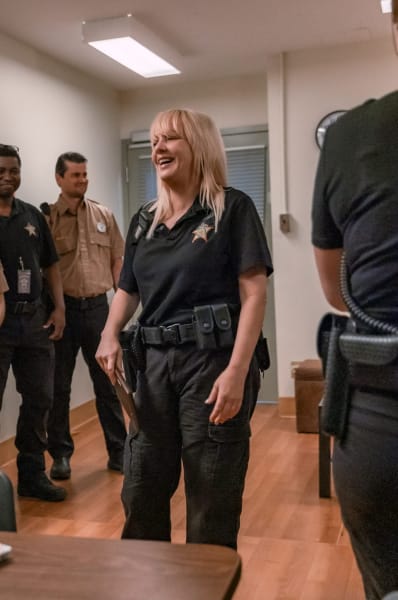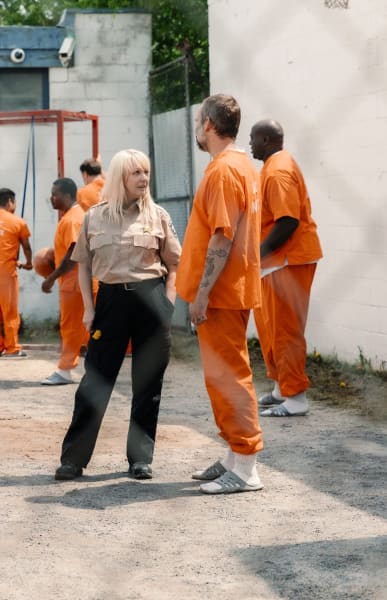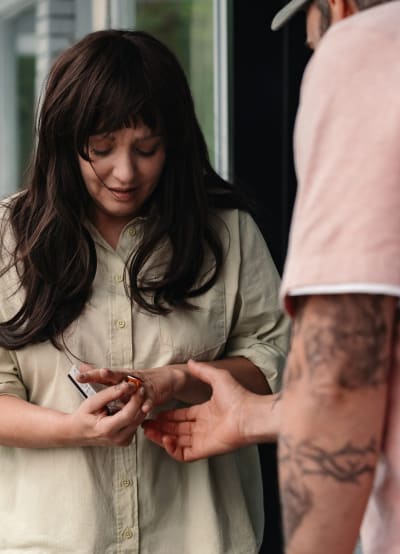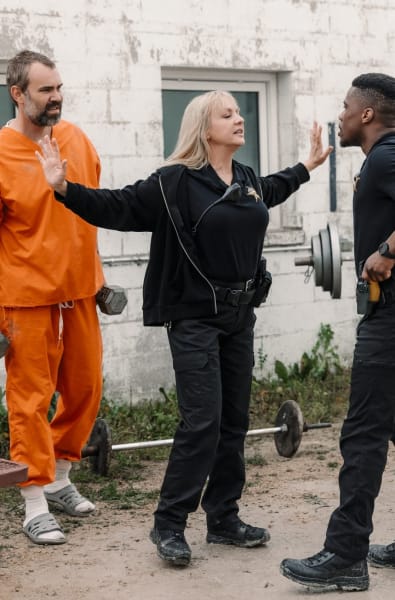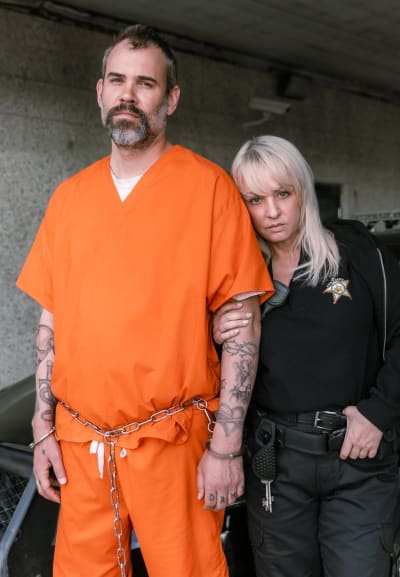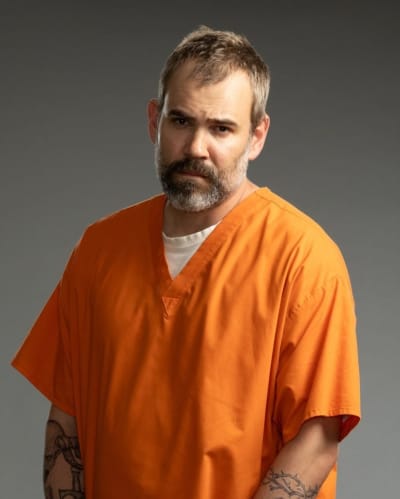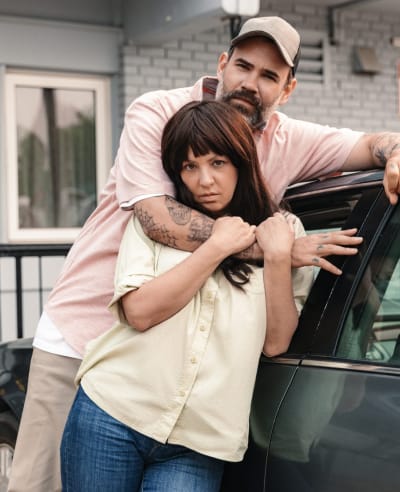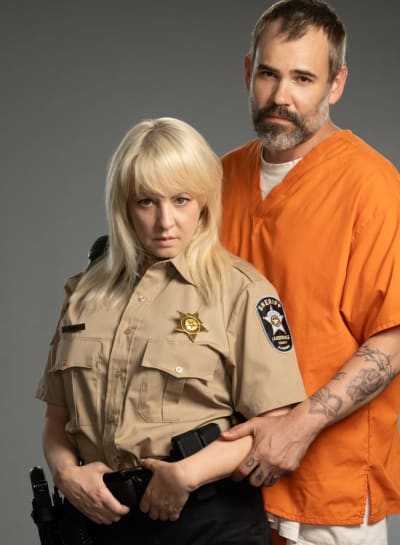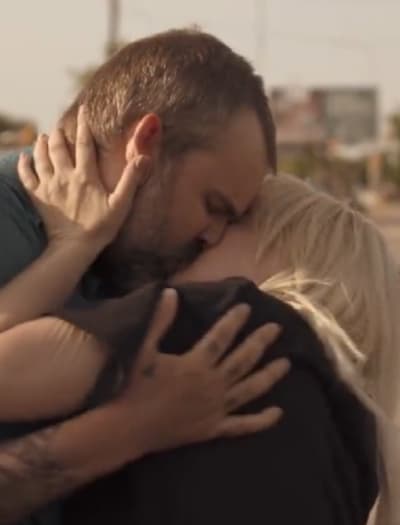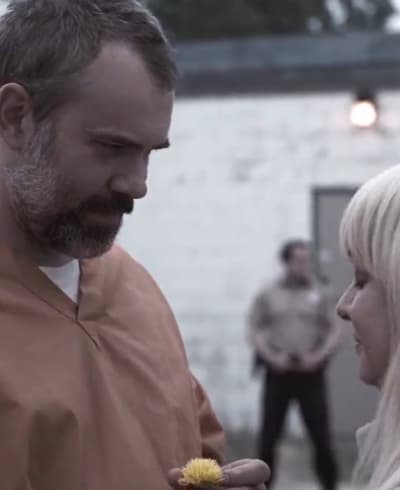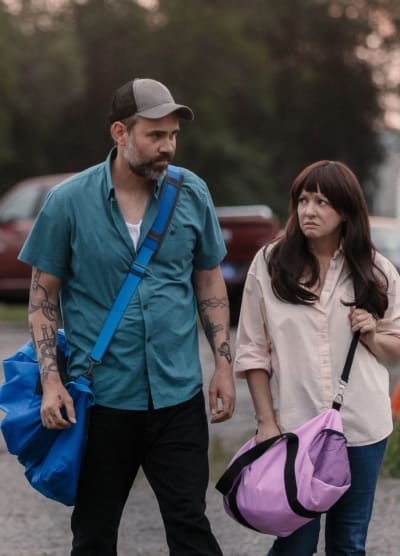As the saying goes, “You can’t help who you love.”
But it’s always difficult to process or fully understand loving someone so much that it results in scandal and tragedy.
While Bad Romance: The Vicky White Story is based on that scandalous Bonnie & Clyde, starcrossed lovers romance between a correctional officer and a convicted felon, at the very heart of the film, it was about this woman who felt displaced and swallowed up whole by life.
Vicky’s story is sad, well before her untimely death by suicide.
While it’s not Wendi McLendon-Covey‘s first foray into a more dramatic role, it’s always a jolt to the system to see her play such a serious role.
The transformation of this lively actress into this exceedingly drab but wry middle-aged woman with not much to lose is fascinating in its own right.
And Rossif Sutherland, yes, brother to Kiefer Sutherland, does a great job of adding some layers to Casey White.
Dare I say he makes this man sympathetic?
While not necessarily a victim of the system or society nor downplaying his series of misdeeds that landed him in prison, Casey is this man you come to understand a bit as someone who likely never stood a chance in life from the beginning.
When you tune into Casey from the start of the film to its end, a familiar, ironic, given the nature of this film, Breakout Kings quote comes to mind:
As unexciting as it may sound, some machines just come out of the factory broken. You’re a broken machine.
Lloyd
Casey is a broken machine, something he’s cognizant of, and he manages to express well enough during one of Casey and Vicky’s most vulnerable, emotionally honest, and intimate scenes of the movie in that hotel room.
But let’s get back to Vicky first.
The movie does a serviceable job of setting the groundwork for how someone like Vicky could end up doing the unthinkable thing that she did, breaking a felon out of prison and leading police on a nationwide manhunt.
The film leans heavily into the glamorization of the notorious couple Bonnie & Clyde with how they depicted the evolving romance between the Whites and their subsequent end.
When telling a story like this, while there are mixed feelings about making these figures “sympathetic,” there’s more something to be said about capturing their humanity.
Typically, we love to separate ourselves from the shocking actions of other people, stripping those of their humanity to justify why we can’t fathom ever finding ourselves in their situations.
Bad Romance doesn’t do that in the least. Instead, it leads into the romance by spending most of the movie showing a disquieting bleak look into Vicky’s life that could easily hit too close to home for more than a few.
The monotony of Vicky’s life feels all too familiar. The movie humbles you quickly if you went into this film on a high horse about this “stupid” woman who threw everything away and died for a convicted felon.
Because who hasn’t felt as Vicky has?
We get this look inside of this woman’s life as she falls victim to a dull routine of going to a job, donning this sexless, personality-devoid uniform, where she feels nothing she did matters or had an impact, and took care of an ailing father while fending off a meddlesome mother.
She went home to a sad, dreary house, with her only companion being an adorable dog named Spike. She got sucked up in the grind of working nonstop and not having much of a life outside of that.
And eventually, as it tends to do, all of that takes a toll and wears a person down, leaving them wondering what they’re even doing with their life other than wasting away.
Vicky felt like she was just existing and not living, going through the motions, with no one to share her life with, nothing that fulfilled her, and nothing of which she looked forward to through her days.
Related: Murdaugh Murders Part 2 Review: Bill Pullman Delivers A Riveting Perfomance
Her mother’s romantic prospects for her consisted of any available man with a pulse, which did nothing to help with Vicky, who felt like no one had seen her or that she could ever be lovable.
We speak and give credence to men having “mid-life crises” all the time and never unpack the types of lulls and self-reflection that women undergo through various stages of their life, but especially upon hitting middle-aged, single, or rather widowed, with no kids and nothing of which to look forward.
Vicky perfectly depicted some of that unspoken darkness that can loom over Gen X, often tasked with relentless work to get by and the weight of taking care of their parents.
You got the sense that Vicky had this life, and nothing she felt showed for it, and it left her stuck in a rut that she didn’t even know how to climb out of, and when you think of all of that, her mindset, it’s more than easy to understand her far more than you would by reading her actions in print.
Vicky’s loneliness is relatable; her insecurities, feelings of inadequacy, and stagnancy in life give us this authentic look at the woman behind the headlines. Bad Romance certainly gets credit for that.
She wasn’t a happy person and living such a sad life; while some of it was of her own making, it doesn’t change that simple fact.
When she posed questions about what impact she left on others or who would even be at her funeral when she died, it was difficult not to sympathize or empathize with her.
Who hasn’t had those thoughts or considered those existential questions of what they’ve contributed as one person in this humongous world? Hell, I have!
In a way, that made her susceptible to Casey White‘s charms, but the film also does something interesting in bringing that similar level of vulnerability to Casey.
Vicky is sympathetic, yes, but she’s not a victim, and it was important for the movie to balance that well instead of making her this “poor, sad, middle-aged blond woman” who got taken advantage of by a cunning felon.
Bad Romance gives us all this insight into Vicky, making her human, and showing how things click into place without necessarily stripping her of agency, cupability, and her own choices.
Because, in the end, it’s an injustice to her. Vicky made these choices and wanted to do something big — this was her big adventure, a way of shaking up her life, and as twisted as it may be for us to understand, the thing she’s probably most proud of doing because she chased after love and happiness.
Everything she did from the moment she orchestrated this prison break was on her own terms, making her an active participant in her life and fate rather than a passive rider in life.
It was interesting how everyone was hellbent on making her some type of victim when it was far from the case.
And through this film, we get this depiction of Casey as someone who wasn’t manipulating Vicky to get what he desired out of her, but a man who genuinely loved her.
It seems both of them felt “seen” in the relationship they forged in a way that they hadn’t gotten from anyone else in their life.
And maybe their romance was everything that was depicted as being genuine, real, consuming, and more.
Casey was charming in a way that could have easily broken Vicky’s defenses. Every little word and gesture toward her, the flirtations, the little acts of romance seemed like they came from a genuine place.
Who’s to say what their love story would’ve had in store for them if it hadn’t ended in such a tragic fashion?
By the film’s end, you can’t say with any certainty that Casey was just using this woman or that he didn’t love her.
Casey appeared to be many things: charming, charismatic, a bit infantile, hotheaded, and incredibly impulsive. Yet, he also seemed sincere and intriguingly vulnerable.
Given the task of depicting the Whites with complexity and humility, McClendon- Covey and Sutherland both rose to the occasion and delivered.
Vicky and Casey never stood much of a chance. There was no other way for their love story to end, but getting wrapped up in their ride was easy.
Vicky did okay but could not firmly cover their tracks enough to escape. It was surprising that for someone accustomed to security footage from years working in a correctional facility, she never scoped out any places she attended.
Related: Amish Stud Review: Luke Macfarlane Impresses in Tale of Manipulation, Deception, and Murder
Switching cars was smart, but never considering that the law enforcement withholding from the media was a massive oversight.
Trying to appeal to Casey’s desires often caused issues too. Even if they had made it to the Canadian border, there isn’t a snowball’s chance in hell they would’ve managed to get into the country.
They would’ve had a much better shot at getting away crossing the Mexican border than the Canadian one, especially with the cash she had.
And the Mexican border was much closer, which meant they could’ve been across before the cops even caught wind or caught up with them.
More than anything, traveling around with this gigantic escaped convict who can’t blend in well because of his height and calls attention to himself because of his hotheaded disposition was a perfect formula for disaster.
It’s hard to say if Vicky truly believed they could get away with things. Was she in it for a good time or a long time? My bet is on the former.
The fact that she purchased so many weapons and casually made mention of going out in a blaze of gunfire if necessary spoke volumes about where she stood on the issue.
In that sense, it was not a surprise when she shot herself after the car flipped over and they arrested Casey. For Casey’s talk, his devotion and love for her, and his 75-year sentence, it doesn’t appear that the man wanted to die.
Related: Buying Back My Daughter Review: An Unflinching Look At How Trafficking Prevails
And maybe that’s one of many reasons why there’s still uncertainty about how “real” his love was for Vicky.
He heard that sickening gunshot and went back to prison. But did he already check out and move on after her death, or did it mean something to him?
We’ll probably never know for sure.
But maybe we leave things with a better understanding of Vicky White.
The notation that 150 people showed up at her funeral was notable. Sure, we can guess that some could’ve been individuals caught up in the case or just curious.
But it’s sad that a woman like Vicky severely underestimated the impact she had on those around her. Her colleagues thought she was the best worker and adored her. She had a great rapport with most of the prisoners she oversaw in the facility.
Her mother, while meddlesome, loved her.
And we saw how people who got out of prison credited her for changing their lives, and Vicky was too wrapped up in her own darkness to realize it.
It should be a wake-up call for many that regardless of what we may think, what we do matters, and there is an impact we leave on the world — it shouldn’t have to result in notoriety.
Over to you, Lifetime Fanatics. What are your thoughts on Bad Romance? Did you appreciate the performances? Sound off below.
Jasmine Blu is a senior staff writer for TV Fanatic. She is an insomniac who spends late nights and early mornings binge-watching way too many shows and binge-drinking way too much tea. Her eclectic taste makes her an unpredictable viewer with an appreciation for complex characters, diverse representation, dynamic duos, compelling stories, and guilty pleasures. You’ll definitely find her obsessively live-tweeting, waxing poetic, and chatting up fellow Fanatics and readers. Follow her on X.
